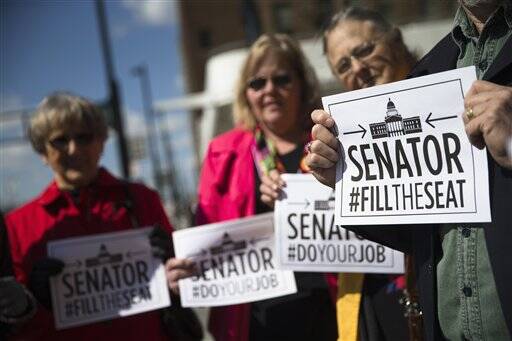As the fight over Judge Merrick B. Garland’s nomination demonstrates, the Supreme Court is not free from politics. Nevertheless, since Marbury v. Madison (1803), the court has asserted itself and been accepted as the nation’s impartial referee. Chief Justice John Marshall, who penned the decision, was himself a lame duck appointee nominated after the presidential election and sworn in just a month before Thomas Jefferson’s inauguration. The shrewd decision, which invalidated the appointment of Marshall’s fellow Federalist jurists, enshrined the power of the court to pass judgment on both executive and legislative actions.
Only the Supreme Court is able to establish nationally applicable constitutional standards. The willingness of the nation to assent to that authority is crucial to our democracy. As Justice Robert Jackson wrote in 1953, “We are not final because we are infallible, but we are infallible only because we are final.” A vacancy on the court impairs its ability to issue controlling decisions and may undermine its role as our last and best guardian of the rule of law.
The court sets its own calendar and selects most of the cases it hears. A vacancy’s impact can be minimized by putting off some cases and resolving others on less controversial procedural grounds, but some critical, time-sensitive issues must be resolved. A prolonged vacancy creates the possibility of 4-to-4 ties that leave conflicting lower court decisions in place and subvert the court’s role as a unifying force. Until a new justice is appointed the outcome of several important cases hangs on the ability of the eight remaining justices to reach consensus.
State restrictions on abortion services. The Fifth Circuit has determined that Texas may require abortion clinics to comply with standards applicable to ambulatory surgical centers and doctors who perform abortions to have admitting privileges at a nearby hospital (within 30 miles). An appeal from that decision was heard on March 2, 2016.
Justice Anthony Kennedy likely will cast the deciding vote unless the justices send the case back to the trial court for further findings of fact. If the court decides the merits of the case and Kennedy sides with the conservatives, the likely tie will result in a win for the state, but the decision will not have precedential value outside the Fifth Circuit.
DAPA and expanded DACA immigration benefits. On April 18, the court will hear arguments regarding the Obama administration’s decision to grant employment authorization and lawful presence status to certain unauthorized aliens. The case presents several questions of law. The court could decide it on narrow procedural grounds or issue a substantive decision on the scope of executive authority. A third option is to delay until after the election. In that event, if a Republican becomes president, the program will be eliminated and the case could be declared moot; if a Democrat wins, the court will be forced to issue a decision.
Voting rights and election law. Perhaps the most compelling argument for the speedy appointment of a new justice is Bush v. Gore. The case that decided the outcome of the 2000 presidential election dramatically demonstrates the importance of maintaining the court’s ability to make final and binding legal rulings.
Many disagreed with the 5-to-4 decision that reversed the ruling of the Florida Supreme Court, but Mr. Gore and the nation acquiesced. No one knows what would happen if a weakened court is unable to resolve a similar voting rights dispute or a challenge to a candidate’s “natural born” citizenship.
Executive and legislative responsibilities. The Constitution requires the president to fill Supreme Court vacancies “by and with the advice and consent of the Senate.” Political considerations have led to several bitter appointment battles over the years, but only eight in our history have led to vacancies that lasted longer than one year, with the most recent spanning 391 days in 1969/70. Most modern vacancies have been filled within six months.
A divisive political standoff resulting in a prolonged vacancy on the court threatens not only current cases but could have a long-term impact on the nation’s confidence in the court’s neutrality.
Judge Garland is undeniably moderate in his judicial temperament and could foster compromise on the court that would generate fewer divisive 5-to-4 decisions. Those who oppose his confirmation and appointment may later regret this missed opportunity.








